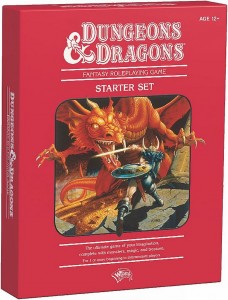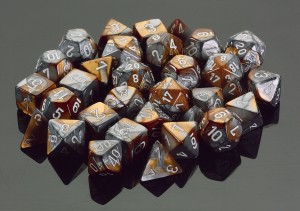Roll the Bones – Pen and Paper RPGs Part I
 Harman J. Peterson had only been a vampire for a year, but within the space of a week he found himself bound up in the slimy politics of the Camarilla. He had been a government man all his life, so oddly enough, he was right at home wheeling and dealing over DC with the undead. Today though, he was a little unmatched. He showed up to a game of Baccarat to try to bargain with the local fat cats, maybe get them to realize that the Sabbat clan weren’t their buddies at all. He wasn’t expecting Solomon Hurst, head of the Sabbat, the butcher of Baltimore, to be on the other side of the table. Hurst ruled the Sabbat, and he wanted to reign over DC too. He was charismatic enough to convince the local politicians that a rule under undead tyrants who believed men were but meals would be best for them. Harman knew that he’d be in for the fight of his life.
Harman J. Peterson had only been a vampire for a year, but within the space of a week he found himself bound up in the slimy politics of the Camarilla. He had been a government man all his life, so oddly enough, he was right at home wheeling and dealing over DC with the undead. Today though, he was a little unmatched. He showed up to a game of Baccarat to try to bargain with the local fat cats, maybe get them to realize that the Sabbat clan weren’t their buddies at all. He wasn’t expecting Solomon Hurst, head of the Sabbat, the butcher of Baltimore, to be on the other side of the table. Hurst ruled the Sabbat, and he wanted to reign over DC too. He was charismatic enough to convince the local politicians that a rule under undead tyrants who believed men were but meals would be best for them. Harman knew that he’d be in for the fight of his life.
The situation laid out above sounds absolutely insane. Vampires? DC? Camarilla and Sabbat? Does anyone even play Baccarat anymore? But you have to admit, there’s a certain appeal there, a danger, a je ne sais quoi. Welcome to tabletop pen and paper roleplaying. Maybe you’re a gamer who’s rolled a set of dice across a dinner table before. There are veterans among us accustomed to the party holding their breath as the D20 tumbles across the battlemat. Or maybe you’re a gamer with a hole in your education. It’s not your fault! There are gamers who can wax on for hours about the weird quirky turn of events that besot his or her character in Fallout: New Vegas, or those that still haven’t entirely emerged from Skyrim. There are the people who ignored Guild Wars 2, Tera Online, and Mists of Panderia because when Star Wars: The Old Republic was released, they knew they had found home. Some gamers want choice, conflict, and dynamic gameplay in their RPGs. To these gamers, I beckon you over to the pen and paper table.
This piece kicks off a series of articles, and the goal is to talk about pen and paper role playing games. I currently play in three RPGs a week. There’s a fourth brewing. I have written novels of character development, plot twists, mysteries, and interparty conflict. I’ve sampled a bevy of systems, from the World of Darkness to the ubiquitous Dungeons and Dragons to the only game I know where you can die during character creation, Traveler. With all of this under my belt, I am still a complete virgin to many systems, not to mention the fact that as a 21 year old I lag behind my comrades who have been rolling dice since I was still in the womb. This series will be about education, but it will also be about discovery, exploration, and good old fashioned fun.
But with the technology of today, why bother playing pen and papers? Why use battlemats, miniatures, and dice instead of an Xbox or a gaming PC?
My friend Matt told me a story once. He was DM’ing (DM is short for Dungeon Master, and means to ‘run’ the game) a game for his buddies’ kids. They were all about to enter what was clearly the lair of the final boss. They were low on potions, low on spells, and low on hope. Yet the mood remained buoyant and light-hearted — until one of the kids asked Matt whether they could save their progress.
Matt responded with a smile that no, there were no save points. Terror set in. The kids began to divide their potions, check abilities, count their arrows and say their prayers. These kids had never played a pen and paper before – only video games. As brutal as playing Super Mario Brothers on the NES was, at least you had more than one life. In pen and paper games, death really can be the end.
 With those high stakes, the answer of what makes pen and paper games special comes to life. People treasure and protect their characters. I’ve run Mario into lightning fields, had Link drown in Hyrule Lake, watched Big Boss succumb to quicksand, shrieked as Leon Kennedy lost his head to a chainsaw, and cringed as Commander Shepard died in the cold vacuum of space. But I could always pick up the controller and reload. In pen and paper games, the digital safety net disappears, making the experience much more thrilling. I’d rather get my kicks from rolling on the psyker table in Dark Heresy than playing Dark Souls any day of the week.
With those high stakes, the answer of what makes pen and paper games special comes to life. People treasure and protect their characters. I’ve run Mario into lightning fields, had Link drown in Hyrule Lake, watched Big Boss succumb to quicksand, shrieked as Leon Kennedy lost his head to a chainsaw, and cringed as Commander Shepard died in the cold vacuum of space. But I could always pick up the controller and reload. In pen and paper games, the digital safety net disappears, making the experience much more thrilling. I’d rather get my kicks from rolling on the psyker table in Dark Heresy than playing Dark Souls any day of the week.
Something that amplifies that exhilaration is the presence of other players. All of my friends agreed that we preferred playing Super Smash Brothers Melee on the Gamecube in my basement as opposed to playing Super Smash Brothers Brawl through online play. We quickly came to the conclusion that sitting on my couch, trash talking and hooting and hollering and just being close amplified the experience. Anyone who played a competitive game with their siblings as kids can confirm this – playing games with someone who is actually in the room with you is levels ahead of getting text messages through Xbox Live or even having to fiddle with the audio levels of Ventrilo.
The story that I started off with, where Harman J. Peterson tried to wheel and deal across the table from Solomon Hurst, is a true story. The best part of that story is what happened after Harman’s player won the political agreement; Soloman Hurst turned into a giant half-solid, half-mist bat and pursued Harman like the devil. His player chose to dive out of a window, which refused to shatter at first. On his second attempt, he managed to burst out to freedom on a second floor drop. He failed the roll to land well. With Hurst hot on his heels, Harman ran into traffic, hoping to jump onto the bed of a pickup truck passing by. He rolled poorly again and got hit by a car. He attempted to recover by grabbing onto the undercarriage, but another poor roll left him in the middle of the street. He ended up an inch away from death, with every other player shrieking in anticipation as Hurst worked his teeth under Harman’s skin… That is an experience I will remember to the grave, whereas it’s very hard for me to recall that amount of adrenaline and excitement from a video game.
The third element is of utmost importance: pen and paper games are cooperative. Sometimes, this collaborationcan be extremely simple. A collection of adventurers meet in a bar and now they are going to fight monsters and get gold. Hooray! Other times, it is more complex – the characters on the board have personalities, and motives, and are agreeing to help each other for their own gains that can’t be accumulated in the experience bar of a character sheet — power, love, influence, or even something more mysterious. No matter what, with a good group of players, even if characters are at odds or backstabbing, the group is still in a silent agreement to take the narrative of the game to its end. The Victory Condition of a pen and paper will always be met as long as every player contributes to a failure.
Pen and paper RPGs are an ideal group activity. Next column, I intend to showcase a perfect beginner RPG that is nearly free to play (no books, models, mats, or dice!), is guaranteed to stretch your roleplaying muscles and also send shivers up your spine!
About This Post